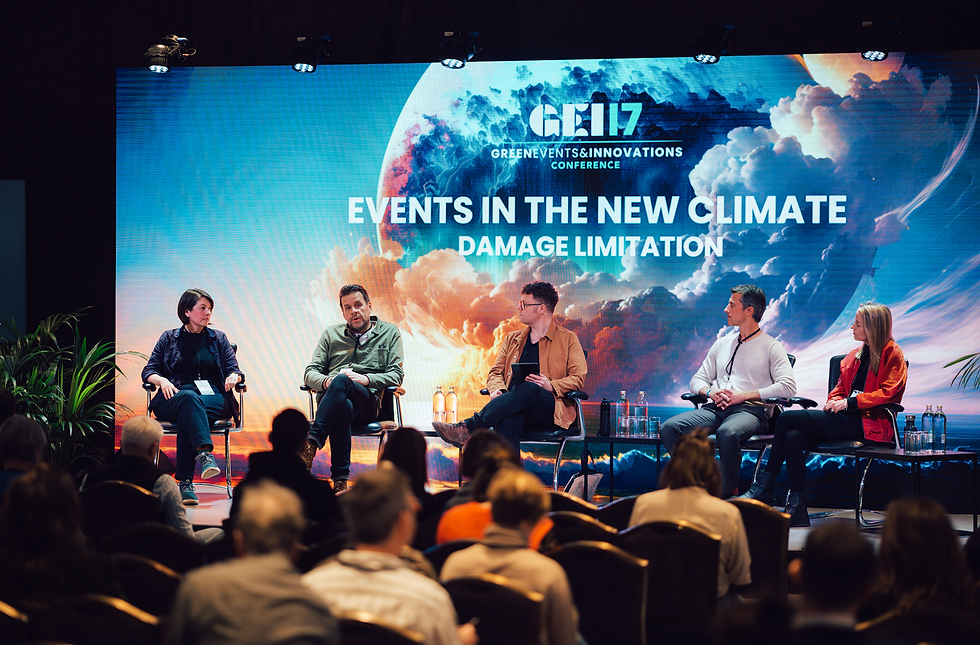4 Powerful Quotes from GEI17 that Redefine Sustainability in Live Events
- Aurore Groult

- Mar 11, 2025
- 4 min read

The events industry is at a turning point. As climate change continues to impact global operations, festivals, clubs, and venues are being pushed to rethink everything from food and drinks, to energy sources and audience engagement.
Last month we attended the Green Events & Innovations Conference 2025 (GEI17) in London. The annual conference brought together industry pioneers to tackle one big question: how can we make live events more sustainable? From rethinking food and drink offerings to the realities of climate change impacting event logistics, GEI17 proved that change isn’t just necessary and urgent - it’s happening right now.
Here are four standout quotes from the conference that capture key takeaways:
"We're trying to make smart events within dumb regulations." — Mark Donne
The live events industry is innovating at a rapid pace, but policies and regulations often struggle to keep up. Mark Donne (Writer & Film Maker) who was there to speak about the results of the work done for Massive Attack's landmark Act 1.5 in Bristol, captures this challenge in this quote, as organizers creatively work around outdated rules to push for sustainable solutions. From reducing flights and optimizing transport to using renewable energy, event planners are actively lowering their carbon footprints. However, they frequently face bureaucratic hurdles that hinder their progress. The message? We need smarter policies to match the ambition of the industry.
As Dale Vince (Ecotricity & Forest Green Rovers FC) also emphasized during a panel, the three biggest areas for sustainable impact at events are energy, transport, and food. Live events have a unique opportunity to engage audiences on these issues and lead by example. By integrating renewable energy sources, promoting plant-based catering, and adopting sustainable practices, events can set a powerful example for change. Forest Green Rovers’ fully vegan stadium proves that audiences are open to this shift, when it’s presented in an inspiring and accessible way.
"People don’t like to be told what to eat." — Dale Vince
The demand for sustainable and ethical options is growing rapidly, with event-goers increasingly seeking transparency and healthier alternatives. According to Adam Hempenstall (Peppermint Bars), festival attendees are now more likely to ask questions like, "Where is this beer from?" and "Do you have gluten-free options?" This shift reflects a broader trend toward mindful consumption, including a preference for plant-based menus and low-alcohol or functional beverages infused with ingredients like Lion’s Mane and Milk Thistle.
However, while the future of event catering is undoubtedly plant-based, how these options are presented matters. People don’t like being told what to eat, and pushing change too forcefully can lead to resistance. Subtle, effective framing is key: instead of saying “we’re out of beef burgers,” venues can say, “we’ve sold out of plant-based options.” This small linguistic shift can have a big impact on acceptance, as choice and messaging remain crucial in catering to the new generation of eco-conscious, health-focused attendees.
"It's about just waking up every day saying "what can I do?", knowing that it will never be enough.” – Moby
Moby’s perspective on sustainability (that it’s not about perfection but consistent effort) is a reminder that every small action counts, even when the overall impact feels minimal. It’s about showing up every day, making conscious choices, and pushing for better systems, even if those changes seem incremental. This approach is evident in the growing awareness at live events, where audiences are demanding more transparency about the products they consume.
The shift towards sustainability is about offering options, not forcing change. Tobias Azizah (Meta & Vegetarian Society) approach of subtle, almost unnoticed changes helps to accommodate everyone while still moving toward better solutions. "The goal is to make 80% of the people happy while accommodating for everyone" he says. It’s about finding ways to balance pleasure, health, and the planet knowing that every effort, no matter how small, builds toward a larger, more sustainable future. As the live events sector faces climate challenges head-on, it’s clear that responsibility lies in the hands of those making the choices from catering owners to event organizers.
"The L.A. fires is the first time we saw an impact on indoor venues [not just outdoor festivals] due to weather conditions." — Eric Distler
Climate change is no longer a distant threat, it’s already disrupting live events in real-time. Extreme weather events like wildfires in Los Angeles have created conditions so severe that even indoor venues have become unsafe. This underscores the urgent need for climate adaptation strategies in event planning, from better air filtration systems to comprehensive emergency response protocols.
As Eric Distler (AEG) shared, he personally lost his home to extreme weather, highlighting the pressing need for climate resilience in the industry. Steven Howell (Howden Insurance) also pointed out that external climate conditions are now affecting indoor events, something that was virtually unheard of until recently. With risks ranging from floods to heatwaves, the future of live events must account for a world where extreme weather is the new norm.
The bottom line? Change is Inevitable... but how we adapt is up to us!
GEI17 made one thing clear: sustainability in live events isn’t a trend - it’s an urgent necessity. Whether it’s tackling ticketing emissions, making plant-based food the standard, or redesigning festivals to fit within environmental limits, the industry has the power to lead the way. Now, it’s about taking action.
What do you think? Which of these takeaways resonates most with you? Let’s keep the conversation going.





Comments